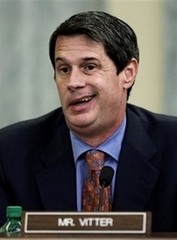
June has been a relatively average month for Democrats. They have gained ground in crucial tossup races such as North Carolina, Illinois, and Pennsylvania; yet initially strong Democratic incumbents in Washington and Wisconsin are showing signs of weakness, also the southern states of Arkansas, Louisiana and South Carolina are looking increasingly out of reach or extremely challenging for Democrats.
Races trending Democrat:
IL: The GOP candidate, Mark Kirk, has suffered setbacks as he has been caught on more than one occasion embellishing his military record. This gives the Democrat, 34-year old Alexi Giannoulias room to stage a comeback, as he has experienced a slight rebound in the polls. Also, Mark Kirk is considered to be a very moderate Republican, as he voted for Cap-and-Trade; Kirk could face the wrath of the far-right wing of his party, as conservatives are expected to draft a strong Tea Party candidate. Similarly, the progressive Green Party is fielding a formidable candidate, LeAlan Jones, who could detract from Giannoulias' voting share, especially among blacks.
LAST POLL: GIANNOULIAS-31% KIRK-30% (D+1)
KY: The controversial Libertarian Republican Rand Paul has seen a slight sag in his poll numbers due to some of his polarizing comments. He still retains a modest lead over Democrat Jack Conway; Conway is more of a traditional KY politician.
LAST POLL: PAUL-49 CONWAY-42 (R+7)
NC: Last week, NC Democrats chose their nominee for the Senate seat held by Richard Burr. NC Secretary of State Elaine Marshall is seen as a top-tier challenger for Burr. In their first Senate debate, Marshall seemed to outshine Burr; she seemed more passionate and authentic while Burr was about as charismatic as George W. Bush. The last poll taken has Burr and Marshall in a statistical tie; Burr is by far the most at-risk GOP incumbent. Expect great things from Marshall.
LAST POLL: BURR-44% MARSHALL-43% (R+1)
Races trending Republican:
SC: With the Democrat's nomination of Alvin Greene, DeMint becomes the luckiest incumbent of this cycle. For Democrats, SC is gone, gone, gone.
LAST POLL: DEMINT-58% GREENE-21% (R+37)
WA/WI: In a normal year, Patty Murray of Washington and Russ Feingold of Wisconsin would be considered safe. However, the GOP tide of this cycle has given way to credible Republican challengers in each of these races. Murray faces twice-failed gubernatorial candidate Dino Rossi; Rossi is perhaps one loss away from being considered a perennial candidate. Before Rossi's entrance in the race, Murray had a double-digit lead over a GOP opponent; Rossi is now within 5 points of Murray. In Wisconsin, Feingold, a strong liberal voice in the Senate, is leading his GOP opponent, businessman Ron Johnson by 2 points. Similar to Rossi, Johnson came into the race relatively late. The low poll numbers of Murray and Feingold can be largely attributed to the national frustration towards Team Obama; I expect once campaigning season gets underway both Democrats will widen their leads. For now, I have moved both of these races down from "Likely Democratic" to "Lean Democratic." I believe that the only way for Murray and Feingold to loose is if the economy worsens come November. If that is the case, I expect Feingold to fall before Murray.
LAST POLLS: WA: MURRAY-50 ROSSI-45 (D+5)
WI: FEINGOLD-45 JOHNSON-43 (D+3)
NV: Tea Party favorite Sharron Angle has rebounded and now posts slight leads over Senate Majority Leader Harry Reid. Still, I expect Reid to pull through in the end due to his sheer 17-1 funding advantage.
LAST POLL: ANGLE-48% REID-41% (R+7)
AR: Things aren't getting any better for the struggling Blanche Lincoln of Arkansas. After barely fending off a progressive challenge from AR Lt. Gov. Bill Halter, Lincoln's reelection prospects are looking dimmer by the week. She effectively has only 52% of her party behind her, as 48% voted for Halter in the primary runoff; Lincoln must consolidate her own base before she can worry about the general election. Meanwhile, Rep. John Boozman has been able to build a landslide leads over Lincoln. While Lincoln struggles to get 33% of likely voters in the polls, Boozman flirts with 60%...ouch. Polls showed that Halter at least held Boozman under 60%. Lincoln essentially won the primary by getting Bill Clinton to vouch for her; if she is to win, she must HEAVILY rely on Clinton.
LAST POLL: BOOZMAN-61% LINCOLN-32% (R+29)
LA: Despite Vitter going to bat for BP in the wake of the oil leak, he still posts solid leads over Rep. Charlie Melancon. Melancon would make a much better senator; he has the passion and record to help LA citizens, Vitter is a tool. This race could get interesting though.
LAST POLL: VITTER-53% MELANCON-35% (R+18)
Races trending Independent:
FL: Govna' Charlie Crist looks good to become FL's next senator. The Democratic bench is weak; the presumptive nominee is Rep. Kendrick Meek, might not even make it out of his primary. Meek struggles to reach 25% in this three-way race. No worries for the national Democrats though; there's over a 90% chance Crist will caucus with the Democrats. The Republicans have unofficially dumped Crist as one official put it, "If the GOP leadership got Charlie Crist in a dark ally, all that would be left is a tuft of [Crist's] white hair." Will Crist looks good now, his lack of an official party affiliation will likely hurt him down the road, as he will hard-pressed to stay neck-and-neck, in terms of funding, with conservative Republican darling Marco Rubio. However, I'm betting on Crist.
LAST POLL: CRIST-42% RUBIO-32% MEEK-14% (I+11)
.png)





.gif)









.jpg)



